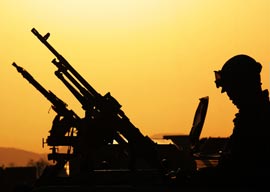
October 16, 2015

Source: Shutterstock
Barack Obama sought as his legacy to bring an end to the two longest wars in U.S. history. On Oct. 15, he, again, admitted failure.
The 9,800 U.S. troops in Afghanistan will remain another year. And, on Inauguration Day 2017, 5,500 U.S. troops will still be there.
Why cannot we leave? Because, if we do, we risk the re-seizure of power by the Taliban we drove out 14 years ago, and a wipeout of all we have accomplished in America’s longest war.
When can we come home? Never, if we hope to secure that for which we have already paid with 2,500 U.S. dead.
For not only have the Taliban shown they can capture cities like Kunduz in the north, ISIS has arrived to begin its trademark atrocities. One can only imagine what will happen to the men, women and girls we liberated when we leave, and Kabul falls. Think Saigon, 1975.
In reluctantly deciding not to depart, Obama seems to have learned the lesson of Iraq. There, we have gone back in with 3,000 U.S. troops, after the president had pulled out the last 10,000.
And what is the balance sheet now on Operation Iraqi Freedom, the bloodiest and most costly American war since Vietnam?
The Islamic State controls Mosul, Ramadi and the huge Sunni province of Anbar. Baghdad relies on U.S. air power against ISIS, but looks to Tehran for guidance. The Shiite militias indispensable to the regime’s survival are, most of them, pro-ayatollah and anti-American.
Unloved and unappreciated, the American Empire soldiers on.
Understandably, President Obama does not want a collapse on his watch in Baghdad or Kabul, though he opposed the Iraq war and was never an enthusiast of nation-building in the Hindu Kush.
The liberal interventionists and neocons who goaded George W. Bush on got us into these wars. But they had no clue as to what would happen once we got in, and they have no idea today on how we can get out. Indeed, they have no desire to get out.
Rather, they want us to repudiate the nuclear deal that the five permanent members of the Security Council and Germany negotiated with Iran, and impose new sanctions. And if Iran refuses to renegotiate and yield, they would happily exercise “all options on the table.”
They would not rule out yet another American war, on Iran, which has a larger population than Afghanistan and Iraq put together, and is far better prepared and equipped to defend itself.
They want the United States to sustain the “good” rebels in Syria and to insist that “Assad must go.” Asked who rises if Assad falls, if not ISIS, they dismiss the question.
But if ISIS is the enemy with whom we cannot deal, why do we not partner with Putin, the Iranians, the Syrian army of Bashar Assad and the Kurds to all pile on and annihilate ISIS in Syria and Iraq?
John Kerry’s repetitive reply—“Assad must go!”
Vladimir Putin’s retort—the Americans have “mush for brains.”
Looking at what we sought to do with our interventions in Libya, Syria, Iraq, Yemen and Afghanistan, has any of them turned out as the war hawks predicted, or we had hoped? Do the prospects of any of these failed states look better for our intervention?